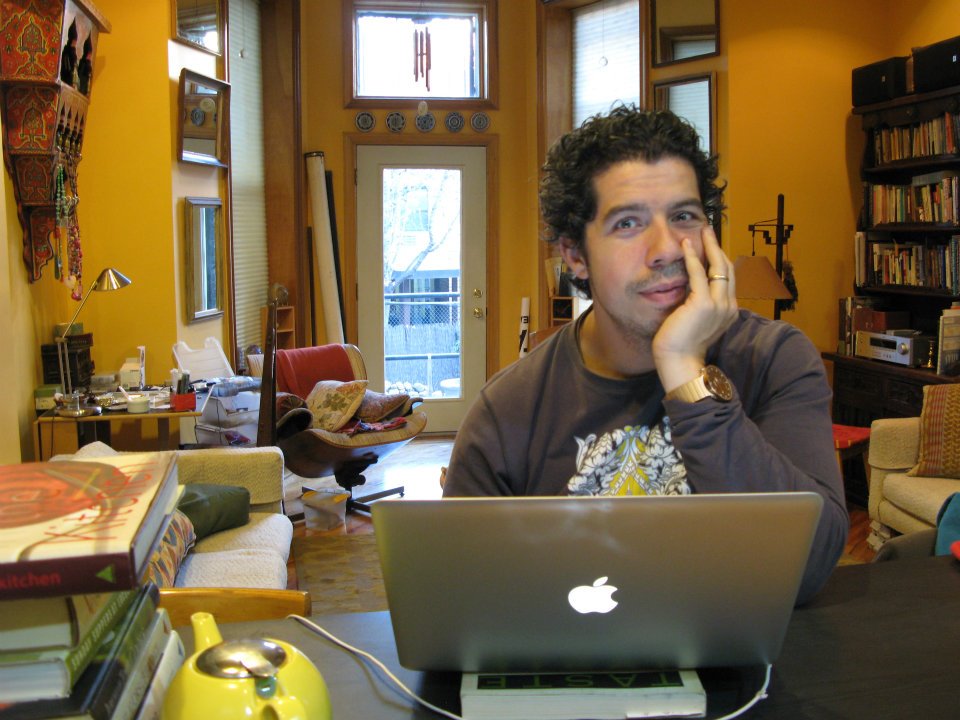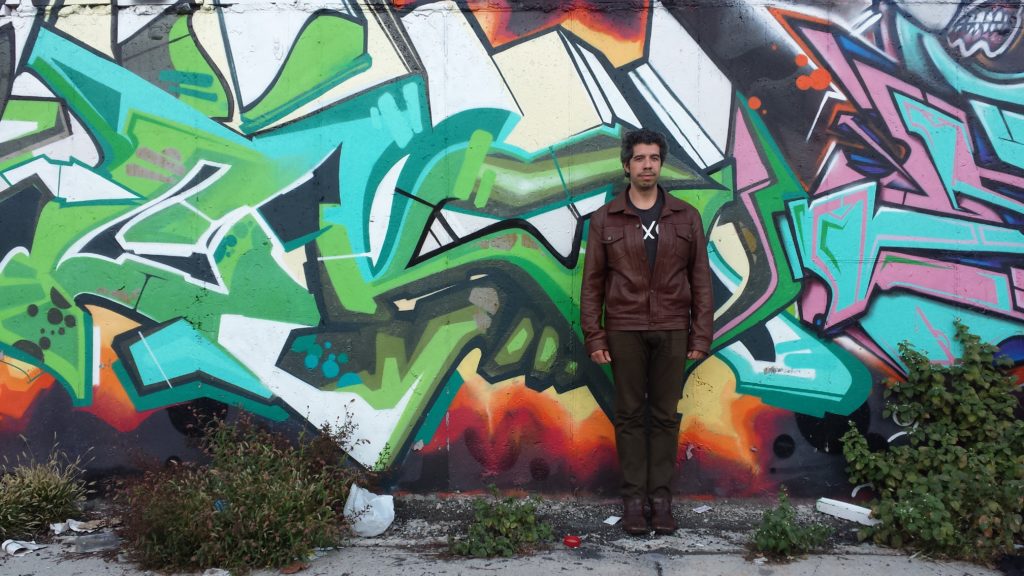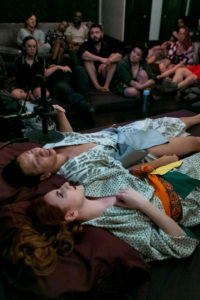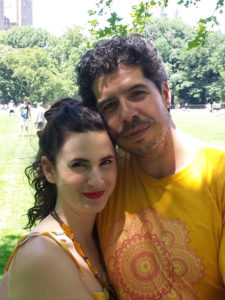
This is my friend Matthew Stillman. How lucky I am! (Portrait taken by me in December 2010)
30. my heart is broken may it never heal: horizontal with a man separated from his wife
Welcome in to horizontal with lila, the podcast that makes private conversations public. We discuss the details of intimacy while the opposite of vertical, wearing robes. In this episode, I lie down with my dear friend of 11 years, Matthew Stillman. Matthew Stillman is a genius.
Matthew: I was raised in a spiritual organization here in New York called The School of Practical Philosophy, which is associated with a school in England called The School of Economic Science, which is associated with the advaita vedanta mystic strain of nondualism. And so I was raised in this very profoundly spiritual organization— I was meditating from a young age, doing— spiritual work, you know, cleaning, for the sake of spiritual activity. So— everything had this deep, reflective philosophical spiritual cast— everything, from schoolwork to sleep to food. (Lila hm’s) It was all there. So I remember from a very young age— and there was no, sort of, specific shaming of it, but— one of these sort of exchanges of “I’ll show you mine, you show me yours,” what, we were caught, and I had, a forced conversation with the head of the philosophy school at the time, a woman by the name of Joy Dillingham — who’s an incredible woman, who I have tremendous respect for, and admiration for. It was definitely like, you knew you were getting a talking-to, and I was, like, five. (Lila laughs softly) And I was told, like, this sort of exchange of energy wasn’t appropriate because it was— I don’t remember the exact words, I was five— but it— I would— simplify it now to say, “It isn’t a good use of your spiritual energy. To cultivate this particular practice.”
Lila: Huh.
Matthew: “Of doing that.” And I’d say, that was the— the general language that I got when I was a kid, was, “Yes, you’re interested in sex and all that’s good, but, you know, it’s important to practice bramacharya, and to have abstin—
Lila: Celibacy.
Matthew: Well, that’s one—
Lila: Or restraint. Matthew: Restraint.
Matthew: Restraint. Because this has— when this energy runs, un–governed, in a body, in a physical or subtle body … it has effects on the citta, on the heart, on the state o f the world, on your energy, on your— capacity to meditate, all this other stuff. So, it wasn’t, like, “You shouldn’t have it,” it just was like, “Control it.”
Lila: Beware—
Matthew: Beware.
Lila: — it’s a dangerous thing to allow it to run rampant, s—
Matthew: Yeah, it c— yeah, it has spiritual consequences for you, other people, and the world.
Lila: (beat) That’s heavy.
Matthew: (brightly) Yeah! (Lila giggles) It doesn’t— it never said, like, “You’ll ruin the world.” But there was a sense that like, your … your heart could be scarred. Uh, you could scar other people’s hearts.
citta (noun) = a Sanskrit word, variously translated into English as consciousness, mind, and perception, from the root word “cit,” translated as, “to perceive.” Can also refer to the heart as an organ of perception and emotional register. Translations are many.
bramacharya (noun) = in the Hindu and yogic philosophies, the Sanskrit word bramacharya refers to either: total celibacy, or, simply restraint in the way one uses one’s sexual energies.
*
Matthew: (weeping) On December the 31st, 2001— actually, December 30th, 2001, I was at a meditation retreat in Waterperry, outside of London, on a, philosophy retreat. This was, maybe the second day of the retreat, maybe the third, and it was going over New Year’s, and … the meals at these events were usually fairly simple, maybe there were, something like, a hundred and ten people from around the world to study and meditate together, all sort of the same age. On the night of the 30th, I sat next to a woman, who was working on— in the kitchen staff, and we were just chatting and, she mentioned that they were totally stressed because they were— had just been given the instruction, before dinner to have a fancy, multi-course meal … for New Year’s, the next day. (Lila hm’s) And they couldn’t get— any— other food than what they already had and this really was fairly simple food, like, salad, cheese, potatoes, like, there wasn’t a lot— fruit. And I said to her, like, “Oh, that’s not a problem, I can— I have experience with this, like, I’d really, take care of this, with a team, pretty easily.” She said, “You’ve got the job.” So on the night of the 30th, right after dinner, I was sort of introduced to everyone who would— be involved, and, nn, we said, I’ll see you all the next morning. So on the morning of the 31st, at 5:30 in the morning, we started working together — Susan was in charge of the kitchen, and we took a break at 7:30 or 8 to meditate, and then we took our first long break at 10, and, at 10am, I knew I was gonna marry Susan. And we weren’t chatting much— we were talking about turnips and soup, (Lila giggles) and this was in a big … Georgian mansion, so, it was clattery stone kitchen, so it was loud, but wherever … we were working, I could always hear Susan. I had this great, abiding sense of partnership with her. It’s— deep sense of wanting to serve her. And I also had, a recollection of a memory, which I had thou— I had thought of before in my life, but, it came then … and the thought that— the memory that I had was of me… when I used to live on 9th Street. When I was, about 2, and I was playing with trains … and the thought that I had then was, “Oh! One day, I’m gonna be married. And whoever that person is … I love them now.” (Lila weeps) And I went back to playing with my trains. (Matt’s voice weeps) And so at 10 o’clock in the morning I just sort of woke up to the fact that I loved Susan, and that I always had. And there was no “falling.” And it was, and is, the clearest thing I’ve ever known. And in the best way, my life got completely disassembled. Because of that. And so within 36 hours, we uh, were talking and, it was like, “I guess we’re … gonna get married!” (Lila laugh-cries) Let’s point in that direction. And we did. And we were married for thirteen years. I was very lucky to be married to her. And that’s how we met.
Lila: (voice weeping) “Whoever that person is, I love them now!”
Matthew: Yeah. My heart is still opening from the experience of— meeting and loving Susan.
Lila: How have you kept it open?
Matthew: I’ve heard it tell, that someone once made the uh, the prayer, “My heart is broken. May it never heal. For it is open.” And perhaps I might have stumbled in the back door of that prayer. ‘Cause I may have been brokenhearted for lots of reasons in my life, but, probably bypassed that break, through my intense spiritual practices. And devotions. And attempts to transcend. But when my marriage with Susan ended, I described it as, that my house then became situated on Grief Bay. (Lila nn’s) And— the winds just blow there. And sometimes hard. And sometimes soft. And sometimes the tides run high, or sometimes low, but, it was always present and my, heart has been broken open, by the ending of that, form of the relationship, a deep sadness, for both of us. In different ways.
Lila: (very softly) I … I want to feel that… I (almost weeps) want to feel that, whoever that person is, I love them — now. ‘Cause in some ways it— and I don’t really believe this, but— in some ways it sort of feels like … well, if it hasn’t happened, yet, then (very small voice) maybe it won’t.
Matthew: It’s one powerful way to love someone, for sure … but I don’t know that it’s … the only way.
Lila: Bef— … oh, you were 2! I was going to say, “Before then, did you know you wanted to be married?” (both crack up)
Matthew: No— oh, maybe I was 2 and a half, so maybe when I was 2 I started to… (Lila keeps laughing)
Welcome in to horizontal with lila, the podcast that makes private conversations public. We discuss intimacy of all kinds while “the opposite of vertical,” wearing robes. To paraphrase my listener ghostheart, horizontal is the podcast that “takes you into my bed and lets your ears watch as I unzip intimate conversations.”

Matthew with … kumquats?
In this episode, I lie down with my dear friend of 11 years, Matthew Stillman.
Matthew Stillman is a genius. Matt’s friendship, ingenuity, keen interest, curiosity, sheer breadth of knowledge / depth of compassion, as well as the ability to forge connections between seemingly unrelated subjects tends to illuminate exactly what you were trying to unearth in essence but perhaps didn’t have the cultural or historical vocabulary for …
He’s changed my life. He’s made my world bigger many, many times over. I owe my life at the Villa (and thus, this podcast) to his curiosity and insatiable desire to share.
In 2012, Matt loaned me a series of books to read. (Sometimes I think of it as my human sexuality book club of one. My independent study.) Then he made himself available for all sorts of conversations surrounding those books. Each one vastly expanded my perceptions of what is true and possible.
First came Arousal: the secret logic of sexual fantasies. Then Sex at Dawn. Then Esther Perel’s mating in captivity.
For years, Matthew enacted a beautiful social experiment slash performance art piece. He sat in Union Square with a table and two folding jars, and a jar with a sign on it that read:
CREATIVE APPROACHES TO WHAT YOU’VE BEEN THINKING ABOUT: PAY WHAT YOU LIKE OR TAKE WHAT YOU NEED.
He used his astonishing breadth of knowledge and ludicrous reserves of memory to offer people a kind of expansion around their problems. A buffer of air around something that may have previously felt suffocating.
My book club of one was not the most out-of-the-box creative approach Matthew has ever offered me in my life (that probably had something to do with “sacred rage”), but I didn’t know about those books before then, who knows if and when I would have found my way to them if it wasn’t for Matthew.
They form the beginnings of how I started to live into what feels like my purpose.
As a person who knows a little bit about a few things, I had never personally known anyone who knows so much about so many things. Perhaps you are seeking a creative approach to something you’ve been thinking about. If so, get yourself over to stillmansays.com
The reason you should have a creative approach session with Matt, more than anything— more than the knowledge, more than the widsom — is his cavernous capacity for empathy. It is from a landscape, a terrain of empathy that he will draw on all the reading and all the study and all the discourse that lives within him. Without his empathy, this wouldn’t strike the chord that translates through you into action. But with his empathy, the springing forward, the impetus, the desire to shift, is the real gift of this work.

Matthew doesn’t enjoy being the subject of photographs. But sometimes he humors me. Like in Bushwick, where the street art blooms. Circa 2016.
If you enjoy lying down with Matthew and I, become a patron of the horizontal arts! Patreon is a great advancement in the life of the artist, a website that crowdsources income. It can make it possible for me to continue creating independent, uncensored, ad-free, homemade radio. For $25 a month you’ll get a monthly recorded love poem, two tickets to a live recording, quarterly lullabies, an invitation to a secret FB group that I curate, and a post of what I call GPG: Genuine Public Gratitude (or not! If you want to remain a private patron, that’s ok too!) There’s loads of other perks on patreon.com/horizontalwithlila

horizontal with Kenneth Play at the last pajama party
And if you want to lie down with us in person, the next horizontal storytelling pajama party will be held in Brooklyn on Sunday, April 29th. Details when you sign up for my lovely mailing list at horizontalwithlila.com
In the first part of this episode with Matthew, we speak of villagemindedness, our elders, Orphan Wisdom School, Matt’s first great love, his wife, and proceeding as if you are needed.
Come, dear one. Come lie down with us.
Links to Things:
Lila’s introduction to sex-positivity, aka, her Human Sexuality Book Club of One:
Arousal: the secret logic of sexual fantasies by Michael Bader
Sex at Dawn by Christopher Ryan & Cacilda Jethá
And Esther Perel’s mating in captivity.
Patron of the horizontal arts!
Stillmansays.com, the place for many things Matthew Stillman
The 36 hidden righteous ones who are said by mystical Jewish believers to uphold the fabric of our world, the Tzadikim Nistarim.
Rowe, a Unitarian Universalist camp and conference center, where Matthew had an awakening as a child, and Lila had one as an adult.
Unitarian Universalist (the only church-like organization — a non-creed, non-dogmatic, open, liberal, and social-justice-minded one — that Lila identifies with)
The spiritual organization that Matt was raised in, The School of Practical Philosophy
Advaita Vedanta (Literal translation of Advaita: “not two.” Matthew’s working translation of Advaita Vedanta: the living knowledge of not two-ness.). A school of Hindu philosophy and religious practice centered around nondualism.
The Robin Byrd show that titillated young Matthew.
Weiser’s— the oldest occult bookstore in the U.S., and where Matt’s father worked when Matt was a child
Die Wise: A Manifesto for Sanity and Soul, a profound book of poetic wisdom about grief, dying, heartbreak, and living with meaning, by Matt’s mentor Stephen Jenkinson
Orphan Wisdom School: the teachings of Stephen Jenkinson, Matt’s current spiritual home
Show Notes (feel free to share quotes/resources on social media, and please link to iTunes, this website, or my Patreon!):
iTunes link: https://itunes.apple.com/us/podcast/horizontal-with-lila/id1238031115&ls=1
website link: https://horizontalwithlila.com/
Patreon link: https://www.patreon.com/horizontalwithlila
[8:06] Matt on his parents and their 45-year marriage. [Note: The 45-year anniversary is actually the sapphire anniversary, according to jewelry stores across the interwebs.]
[8:42] What are his parents like and what are they like together? (Lila’s never met them.)
[10:04]
Matthew: My father is a bit of a misanthrope. (Lila giggles) In the Jewish tradition, it’s said that there are 36 hidden Tzadiks, who are wise men who are critical to holding up the structure of the world — but because of their important spiritual position, they have to be, sort of not bothered by the world, so they tend to be very mean, curmudgeonly, um, fussy, annoying people to be around — and I’ve always accused my father of being a hidden Tzadik. And my father raises his eyebrow and his finger, says, “I’ll never tell!”
[12:40] Does Matthew imagine that his mother became bickery as a result of being married to such a cantankerous partner, or was she like that before?
[13:14]
Matthew: My mother’s very inclined to … have conversations where there’s lots of back and forth, so bickering can ha— can be one aspect of that.
Lila: But, discourse. Matthew: My mother’s a very good con—
Matthew: Yeah, my mother can be a— is a— can be an amazing conversationalist. My mother can also be an amazing monologist. Um. (Lila laughs lightly) And that’s in no way disrespect to her, ‘cause she can just, like, say fascinating, beautiful, interesting things, but just, on one breath and you never really have a chance to go which is totally fine.
[14:35] What was Matt’s relationship with his brother like, when they were both children?
[14:41]
Matthew: I was just about three years older than my brother, and from the— the very youngest ages we were friends, and— ‘cause he was a baby. I think once my brother hit around 4 or 5, we had a very, challenged relationship. A lot of things were p— I think were happening— in our lives. Until the age of— when I turned 13, and my brother was 10, there definitely were years of … a strained relationship between the two of us. Not only strained, but there definitely was strain in it. When I was 13, I went to summer camp, which was a transformative experience for me, and I came back with a completely different relationship with my brother, and … I loved, him. And, and cherished him. And, really it was a, a new dawn. And it was like that until two thousand and three or four. When I was away at college, we didn’t really have much of a relationship just because I was away, but it’s not like there was a particular souring … that happened. And then, two thousand three or four, the relationship changed pretty radically, and— I’d say in the last couple years, our relationship has started to turn to be more cordial.
Lila: What was the magic in that summer camp experience?
Matthew: So I went to a camp called Rowe, a camp and conference center in Rowe, Massachusetts.
Lila: You took me there!
Matthew: I did take you there. That was a good trip.
Lila: It’s a beautiful place. And it was a good trip.
Matthew: Yeah. And Rowe is a … Unitarian Universalist camp, but it’s not in any way doctrinaire about that. And the camp is really geared towards allowing … kids to have a stake in their communities, and be deeply valued for who they are and whatever they need to be. And so a camp like that, at a time like that in your life, where you’re so deeply unsure of who you are and whether being, you know, fat or thin or popular or liked— were always sort of on your mind at school— (Lila mmhm’s) All of those were just— completely disassembled when you were at Rowe and that whoever you— were or needed to be … was celebrated and lauded. And, deeply explored in … conversation and games and … So there was— while there was technically swimming, nothing was mandatory, were weren’t like, doing archery, like, there were arts, but there weren’t like, it wasn’t a craft camp. It basically was a, be around in community camp. (Lila hm’s) And, one of the hallmarks was: learning how to hug well, be around people, and the, the faculty of … love in cultivating relationships, and that’s what, you sort of spent your time doing. For three weeks in a summer.
Lila: I would say that that was also how, for me, the UU Cons, the conferences that we had—
Matthew: Yeah.
Lila: — over weekends at different churches in Florida were.
Matthew: Yeah.
Lila: Just, you could let the freak flag fly, and, that’s where I did a Love Feast for the first time—
Matthew: Mm, yes!
Lila: — which, we had all the, the fruits and the treats and the finger foods laid out and, and you couldn’t feed yourself. What is— what is that definition of heaven and hell, where does that come from? Where, hell is the place where your arms are too short—
Matthew: Or the bamboo jackets. There’s different— it comes from different traditions, and there’s an Indian version of it with uh— and a Chinese version of it with bamboo jackets.
Lila: How is— how does that one go? You’re in a—
Lila: — essentially a straightjacket, kind of? Matthew: You’re—
Matthew: Everyone’s given jackets made of bamboo, and forks and a feast, and everyone’s starving, because they can’t feed themselves, until they realize they can— with their straight arms they can feed each other. And so this is one way to proceed, is by living in service towards feeding (physically and subtly) each other.
Lila: Hmm-hm.
Matthew: And being responsible for other people’s hungers … will allow you to be entrusted with someone feeding you.
love feast (noun) = a happening during which a banquet of yummy finger foods is available for the partaking, on the condition of two rules. 1) No talking, and 2) You cannot feed yourself.
[20:15] When Matt came back from Rowe as a teenager, how did he comport himself differently? How did that shift his relationships?
[21:46]
Lila: There’s that nice phrase of, “Why do your parents push your buttons? Because they created them.”
[21:17] What happened to Matt’s relationship with his brother after they both got married?
[22:46]
Matthew: Daniel I think, is, of the two of us, squarer. The more square brother.
Lila: Yes.
Matthew: And, something that his wife at the time said after, I don’t know, probably about 18 months or— two years of marriage, something like that, she would say to him— and I only found this out years later, she said, “You’re a fucked up person. And you’re fucked up because of your family. (Lila gasps) And, if you ever want to become a normal person, you have to stop talking with them.
Lila: Ohh.
Matthew: And it was one less thing for them to fight about. So my brother, sort of got on board and for years didn’t talk to my, parents, or to me— but we lived in the same building, so, my brother would— when we’d pass each other in the hall, would literally growl at me and scowl. And, was never, I was never given an explanation, but we still owned the house together and I still had to— interact with him, to like, get the ladder, or, you know, borrow the hammer, whatever, annnd— there was just no explanation for it and it was really tense and difficult and Susan (who I was married to at the time), it was a great strain on her, we didn’t realize what— why we had our neighbors hating us, and so we finally asked, like, “Can we have a meeting about this?” And we were told, “If you don’t understand why, then we— there’s nothing to talk about.”
[25:41] How did Matthew’s parents express their love for him?
[26:56] How did Matthew learn about sex, growing up?
[27:15] The first talking-to that Matthew received about sex, at 5 years of age, from the head of The School of Practical Philosophy.
[29:57] The Robin Byrd show that titillated young Matthew.
[31:02]
Matthew: My dad, when I was very young … worked in the premiere spiritual bookstore in the world, um, called Weiser’s— which I was sort of the mascot of when I was a kid. (Lila laughs lightly) And, even though my dad stopped working there when I was … seven, we still went to the bookstore all the time and I still was sort of hanging out there and my father had his own sort of spiritual library at home. I—
Lila: Did you have glasses, then?
Matthew: No.
Lila: I pictured you like a little Harry Potter. Okay, go on—
Matthew: No, not at all.
Lila: So your dad had his own spiritual—
Matthew: I definitely was raised in the stacks, though, and there were huge, gigantic stacks— which I used to climb in like a jungle gym and sit on shelves and read books.
Lila: (giggles lightly) And your dad had a huge spiritual library at home…
Matthew: At home, yes, he did. But I knew from when I was a kid at Weiser’s that, that there was like a section there, which I just would see when I was six and seven and eight— on the intersection of sex and spirit. On tantra, or, any number of things, I just remember seeing those books and thinking they looked interesting. And so in my teens, as I was learning about sex, I’d go to Weiser’s, and I’d read books, because I knew the old guys who worked there, from when I was a kid, and I’d go there and I’d read books on tantra or Taoism and sex, and, sort of, take whatever I could read from the books, and— and I already had my own meditation practice when I was that age, my own spiritual stuff that I was doing, and used to sort of supplement, and learn, and add stuff in and practice myself.
tantra (noun) = a Sanskrit word (the root of which, “tan,” translates to something like, “to spread, expand, weave) which classically refers to esoteric traditions of Hinduism and Buddhism. In a modern context, tantra is much more likely to denote engagement in certain intimacy and sexual practices (such as eye-gazing and synchronized breathing), with the perspective that sexuality can be an expression of the sacred.
[33:35]
Lila: How do we teach our boys to be the kind of men that love and cherish women? (Matthew hm’s softly) Do you have thoughts on that?
Matthew: Yeah. (sigh) This culture is sort of a heartbreak.
Lila: (whispers) So much.
Matthew: Because every force is … really running counter to that happening. And we’re just talking about boys, I mean, the same is true for girls.
Lila: Yes.
Matthew: I suppose the best thing that I could say— because there’s, you know, particular, I could say, “Oh, you know, read these books, or” I think the most— broad thing that I could say that might actually be … implementable, is to start to cultivate villagemindedness. (Lila mmh’s) Because, my idea of what the appropriate thing you might wanna have boys learn … might not be yours. Although, between the two of us they might be fairly similar. But, whoever’s listening … I mean, access to emotion and access to play and—
Lila: Cooperativeness.
Matthew: Cooperativeness, and, um… less intellectualism— all sorts of things could be great benefit to be sure, uh… but I think cultivating villagemindedness— where it’s not just two parents who are responsible for this— but any relationship that’s worth having, is worth having a number of people buying into, its livelihood. And so, it doesn’t just take a village to raise a child; it takes a village to raise a relationship that’ll have the child even emerge. And to support it. And to sustain it. And so, for— and not that this is some sort of magic, that if there’s a village, that all of a sudden it’s like that, but, to have— a whole raft of men and women of different ages, who are responsible for kids who aren’t— and not just the parents who somehow need to imbue all their super wise progressive thoughts, and the grooviest books and, the most liberated conversations … that never watch television and always hug their kids and (Lila chuckles) teach them consent.
Lila: It sounds great! (laughs)
Matthew: It sounds great— I mean, you can do all those things, but, um, and you— and de-gender your, whatever, your books, whatever, like that stuff— maybe that’s important, but, to learn these small lessons from dozens of people. (Lila mmhm’s softly) That’s probably more valuable. At least that’s my sense, and my scent, that I’m following.
Lila: There’s that piece of— cherishing elders, too. When I— see women being treated badly, I don’t see, those folks treating elderly people well, either.
Matthew: Absolutely. Our capacity to have elders— and we have lots of “olders,” to be sure, who take … drugs … but we have very few elders who give medicine.
Lila: Nnnn. I don’t have any elders in my life. None.
villagemindedness (noun) = the mentality (possibly derived from the adage, “It takes a village to raise a child.”) in which — instead of the primacy of the nuclear family unit or the dyadic relationship — the responsibility of support and care is both expected of and received from the community. Stephen Jenkinson, in his book Die Wise: A Manifesto for Sanity and Soul, describes it this way: “a mythically mature and binding mutual life.”
de-gender (verb) = the practice of actively removing gendered language (typically, pronouns), expectations (gendered colors or ways of dressing), and associations, by making things gender-neutral.
[37:44] Matthew on Orphan Wisdom School (his current spiritual home).
Matthew: Orphan Wisdom School is a— it’s a teaching house, a school that was established by Stephen Jenkinson, a man of— from Canada, from Scarborough, Ontario, but now lives … two hours north-ish of Ottawa on a farm. And the Orphan Wisdom School is a school that’s— wonders aloud about how our culture … became so, unskilled in pursuing its relationship to death and grief. And seeks to understand and wonder about how that came to be. And how me might cultivate those skills so we might be able to love life more deeply.
[28:35] The change Lila made in her life after Matt took her to see Stephen speak at Rowe.
[41:41] The story of how Matt met his wife.
[48:08] What did Matthew love about his marriage?
[48:51]
Matthew: There are many things to say, that sweetened my days, in that blessed relationship, and I could go on, but I’d say one small thing, which isn’t small at all, was starting to have my soul get bent in the shape of not living just for myself. But, even more profoundly, maybe beginning to believe in my, worthiness. That Susan would— leave where she was from, and love me as she, did, and does, but in a different way now. I so d— always had the sense like, maybe I’m actually … worth that. So I— in the sweetest way I always sort of had the, the cloud floating around me, like, Maybe You’re Worth It.
[49:57]

Lila & Matt, Yellow in Sheep’s Meadow, Central Park, circa 2013.
Lila: I remember, when I was traveling and I, I came to stay with you for a little bit, and, I said, how I, I really wanted to feel whole. (Matthew mm’s) And you said, “I see you that way. I see you as whole.”
Matthew: Yeah.
Lila: And I feel whole, now… And now I’d really like to feel worthy.
Matthew: Yeah. It’s a great service if we might proceed as if we’re needed, despite any, any clear justification that that’s true. […] So, out of this is, a villageminded proposition as well. That believing in yourself, is actually too big a, prospect for just you, and properly spread out, on being believed-in, by other people— by elders, by friends. We al— all have terrible, myopic visions of who we are. We just can’t see it. So we need other people to believe in us. And to show it. And we need to do it for other people, too, ‘cause they can’t do it for themselves.
30. my heart is broken may it never heal: horizontal with a man separated from his wife
Welcome in to horizontal with lila, the podcast that makes private conversations public. We discuss the details of intimacy while the opposite of vertical, wearing robes. In this episode, I lie down with my dear friend of 11 years, Matthew Stillman. Matthew Stillman is a genius.
Become a patron of the horizontal arts, by supporting me on Patreon, a website for crowdsourcing patronage! Patronage allows artists like me to make independent, uncensored, ad-free work, schedule recording tours, and devote my time to creating more horizontal goodness, for you! Becoming my patron has delicious benefits, ranging from quarterly lullabies to bonus episodes to tickets to live recordings to handwritten postcards! You can become a patron for $2 a month on up, and the rewards just get more sumptuous.



